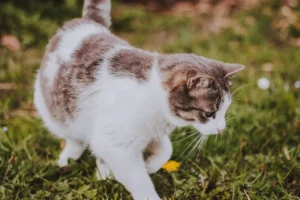Cats are known for their mysterious and sometimes unpredictable behavior. One common aspect of feline behavior that many cat owners may wonder about is why house cats are nocturnal.
Have you ever wondered why your furry feline friend seems to come alive at night? Let’s uncover the reasons behind why house cats are nocturnal.
Evolutionary Adaptations
Cats are natural-born hunters, and their nocturnal behavior is a result of evolutionary adaptations that have shaped their instincts. In the wild, many of their prey are also active during the night, giving cats an advantage as stealthy hunters under the cover of darkness. Over time, cats have developed a heightened sense of hearing and smell, along with excellent night vision, to help them effectively track and capture their prey during nighttime hours.
Light Sensitivity
Cats’ eyes are marvels of adaptation, designed to excel in low light conditions. Their pupils can dilate to let in more light, while a layer of cells behind the retina called the tapetum lucidum reflects any incoming light, giving them better vision in the dark. This unique feature not only aids in hunting but also helps cats navigate in dimly lit environments with ease. Next time your cat effortlessly navigates the dark hallway, you’ll understand it’s not magic – it’s just their impressive light sensitivity at work!
- Additionally, cats have a higher concentration of rod cells in their eyes, which are crucial for night vision. This abundance of rod cells allows them to detect even the slightest movement in the darkness, making them superb predators under the cloak of night.
Circadian Rhythms
Cats are naturally nocturnal creatures, meaning they are more active during the nighttime hours. This behavior can be attributed to their circadian rhythms, which are biological factors that influence their internal clocks. These rhythms dictate when cats feel most awake and alert, with peaks of energy typically occurring during the night. In the wild, this behavior helps cats hunt effectively when their prey is also active.
Domestication Effects
Living with humans and becoming domesticated over time has also influenced cats’ behavior. Domestic cats may have adapted to their owners’ schedules, staying more active at night when humans are around to interact and play with them. Additionally, being indoors most of the time can lead to boredom during the day, prompting cats to conserve their energy for nighttime activities.
- Increased Human Interaction: Cats may be more active at night to seek attention from their owners who are often home after work hours.
- Natural Instincts: Even though domestic cats have been living with humans for centuries, they still retain some of their wild instincts, including a preference for nighttime hunting.
- Quiet Environment: The night offers a quieter and calmer environment for cats to explore and play without the disturbances of daytime activities.
Play and Interaction
Cats are naturally crepuscular, meaning they are most active at dawn and dusk. However, you can help shift your house cat’s activity to better suit your schedule by engaging in play and interactive activities during the day. Spend quality time with your furry friend by providing toys that encourage movement and mental stimulation. Feather wands, laser pointers, or interactive puzzle toys are great options to keep your cat entertained and active. By incorporating playtime during the day, you can help your cat expend more energy and potentially adjust their nocturnal tendencies.
Providing Enrichment
To help your cat be more active during the day, it’s essential to provide enrichment that engages both their minds and bodies. Consider setting up cat trees or shelves for climbing and exploring, as well as hiding treats in various places for them to find. Puzzle feeders and rotating toys can also keep your cat mentally stimulated and active throughout the day. Offering a variety of textures for scratching, such as cardboard, sisal, or carpet, can also help satisfy your cat’s natural instincts and prevent boredom. By providing opportunities for physical and mental exercise, you can encourage your cat to be more active during daylight hours.
Additional Unique Insight:
– Consider setting up a “cat TV” for your feline friend by placing bird feeders outside windows or setting up a fish tank. This visual stimulation can keep your cat entertained and engaged during the day, potentially reducing their nocturnal behavior.
Remember, each cat is unique, so it may take some trial and error to find the right combination of play and enrichment activities that work best for your furry companion. By investing time and effort in providing engaging experiences for your cat, you can help them lead a more fulfilling and active lifestyle during the day.
Creating a Nighttime Routine
Is your feline friend keeping you up all night with their nocturnal antics? Establishing a nighttime routine can help encourage your cat to be more restful during the night. Feed your cat a light meal before bedtime to keep their stomach satisfied. Provide interactive toys during the evening to keep them entertained and active. Create a cozy sleeping spot away from any noise or distractions. Establish a regular bedtime to help regulate their internal clock. Remember, consistency is key when it comes to developing a routine for your cat.
Fun Facts About Nocturnal Cats
Did you know that cats are crepuscular, meaning they are most active during dawn and dusk? Their night vision is exceptional, allowing them to see in light levels six times lower than what a human needs. Cats have a higher body temperature than humans, which helps them conserve energy during periods of rest. They have specialized eye structures that reflect light, giving them that eerie glow in the dark. Cats’ whiskers are sensitive, helping them navigate in low light conditions. Understanding these fun facts can give you a deeper insight into your cat’s fascinating nocturnal behavior.
Alex, a passionate animal lover, has experience in training and understanding animal behavior. As a proud pet parent to two dogs and three cats, he founded AnimalReport.net to share insights from animal experts and expand his knowledge of the animal kingdom.




